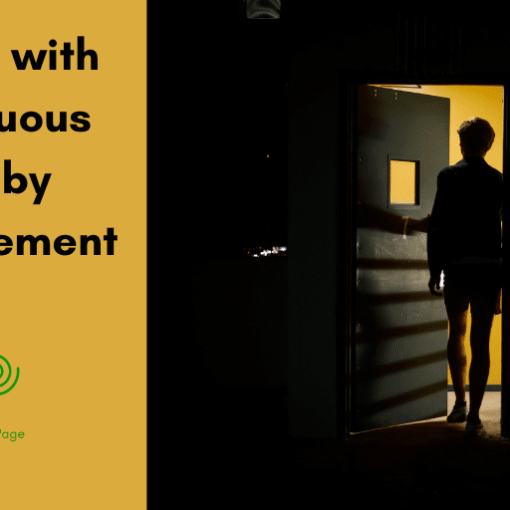So why did the Samaritan cross the road? Perhaps he wasn’t afraid of the sky falling in. Let’s not be chicken with people like us.
I happened to call an acquaintance of mine a few days ago. He does some jobs for me every now and then.
As we talked, he said that he had a kind of personal crisis in his life. So I gently pressed a bit further and found out what had happened.
The same thing had happened to me many years ago. In my gut, I felt a deep connection. We chatted for a bit longer, and then we finished the call.
Later that day, I realized that I could have offered a bit more. I thought that I could have invited him for a chat and a coffee.
I thought of all the excuses not to cross the road as such and invite him in.
- I’m too busy
- He’s too busy
- He might think I’m overly intrusive, nosey.
- I might not know what to say
Then I remembered this post you’re about to read.
Basically, I was a chicken. I was letting the fear of the sky falling stop me from connecting.
So I sent him a text message offering a coffee and a chat. He responded that he was doing ok, but thanked me for the invite.
He knew that someone had crossed the road to him—someone who knew something of his struggle.
How hard was that? I didn’t let fear stop a journey of love.
You could do that, couldn’t you?
Old School Pastor
When I first became a pastor back in 1998, I had the opportunity to spend some time with what I would call an Old School pastor.
Mike Fish was elderly, and his daily life was marked by reading the Bible, reading classical spiritual writings, praying for his community, visiting people in their homes, making friendships, sharing the sacraments, and helping people connect with the Ancient of Days.
His focus wasn’t on building a super church. More so, it was about building relationships.
He had a small group that met in his home comprised mostly of people who struggled with Mental Illnesses.
Young people, who were lost in the noise of life, came to him for stability.
He left me with a couple of deep thoughts.
- Revival is not a true revival unless it changes the situation of the poorest of the poor.
- Always visit people in their homes, and you’ll connect with them better.
He was the man who would cross the road, get into the ditch of struggle, and tend to the wounds of the world.
The man in need of a visit
Jesus once told a parable about love.
On one occasion an expert in the law stood up to test Jesus. “Teacher,” he asked, “what must I do to inherit eternal life?”
“What is written in the Law?” he replied. “How do you read it?”
He answered, “‘Love the Lord your God with all your heart and with all your soul and with all your strength and with all your mind’; and, ‘Love your neighbor as yourself.’”
“You have answered correctly,” Jesus replied. “Do this and you will live.”
But he wanted to justify himself, so he asked Jesus, “And who is my neighbor?”
In reply Jesus said: “A man was going down from Jerusalem to Jericho, when he was attacked by robbers. They stripped him of his clothes, beat him and went away, leaving him half dead.
A priest happened to be going down the same road, and when he saw the man, he passed by on the other side. So too, a Levite, when he came to the place and saw him, passed by on the other side.
But a Samaritan, as he traveled, came where the man was; and when he saw him, he took pity on him. He went to him and bandaged his wounds, pouring on oil and wine. Then he put the man on his own donkey, brought him to an inn and took care of him. The next day he took out two denarii and gave them to the innkeeper.
‘Look after him,’ he said, ‘and when I return, I will reimburse you for any extra expense you may have.’
“Which of these three do you think was a neighbor to the man who fell into the hands of robbers?”
The expert in the law replied, “The one who had mercy on him.”
Jesus told him, “Go and do likewise.” Luke 10:25-37
Who were the Samaritans?
When we hear the word ‘Samartian’ these days, we think of someone who does good deeds. Like the Samaritan in the story, someone who cares for the poor, does more than expected and generally is the one that sacrificially does what many others don’t.
But to those early listeners of this story, they would not have had that connection.
Samaritans were people who lived in an area called Samaria. A central area of the ancient land of Israel.

But there was a lot of cultural and religious baggage these people carried. The Jews considered the Samaritans as “dogs,” or “half-breeds” because they began to intermarry with the Assyrians after Israel’s fall to the Assyrians, contrary to Deuteronomy 7:3-5.
Here were the Jews, pure in lineage and bloodline, but in amongst them, right within their geographical boundaries, were a group of people that had intermarried with the enemy.
The Samaritans were the ones you scapegoated on, the ones on the outside of the group, the impure, the bastard sons and daughters of an illegitimate affair with a foreign lover.
The Samaritans were a people to be avoided at all costs because just being in contact with them could make ones self religiously impure.
People would avoid, avoid, avoid, even walking through the territory. Take a look at the map and see how difficult this would have been. How much energy would have been expended to cross to the other side of the road and avoid contact?
Jesus didn’t. He saw no religious boundaries where love could and couldn’t walk.
In John 4:4, it says that ‘He had to go through Samaria.’ His followers would have wanted to go around the territory. Not Jesus, he wanted to go through. Be part of it.
For Jesus, there are no demarcation zones and boundaries of who was in and who was out.
Do you have someone you avoid? Perhaps, someone you look down on—a people grouping. So let’s be honest and call them ‘Samaritans.’
Perhaps you might have something in your own personality that you despise. That shadow you want no one to see. A place of supposed impurity, shame, or guilt. We despise this part of ourselves; we loathe it.
Jesus wants to walk through this area, too, and bring the good news of unification.
In this Parable, we discover both a desire to avoid and a desire to connect. The religiously pure and legally correct were too afraid, too chicken, to cross the road.
The one who connected was the one who knew his humanity and the need of others who were willing to cross into his ditch. People like us do things like this.
The Bishop of Les Misérables
A few years ago, I read the original of Les Misérables by Victor Hugo.
It’s long. Not a quick read, and really, the stage play and movie don’t do justice to the beauty of the narrative that the original brings to us—so many little stories within the larger story.
Here is one about a priest and his desire to visit some poor people in the mountains. There were robbers (brigands) on this journey, and the town’s mayor warns him of the perils of ‘crossing the road.’ But the bishop is not a chicken.
Read the text two or three times. Then, meditatively see yourself watching these two in conversation.
[The Bishop] “There exists yonder in the mountains,” said the Bishop, “a tiny community no bigger than that, which I have not seen for three years.
They are my good friends, those gentle and honest shepherds.
They own one goat out of every thirty that they tend.
They make very pretty woollen cords of various colors, and they play the mountain airs on little flutes with six holes.
They need to be told of the good God now and then.
What would they say to a bishop who was afraid? What would they say if I did not go?”
[The Mayor] “But the brigands [robbers, thieves, thugs], Monseigneur?”
[The Bishop] “Hold,” said the Bishop, “I must think of that. You are right. I may meet them. They, too, need to be told of the good God.”
[The Mayor] “But, Monseigneur, there is a band of them! A flock of wolves!”
[The Bishop] “Monsieur le maire, it may be that it is of this very flock of wolves that Jesus has constituted me the shepherd. Who knows the ways of Providence?”
[The Mayor] “They will rob you, Monseigneur.”
[The Bishop] “I have nothing.”
[The Mayor] “They will kill you.”
[The Bishop] “An old goodman of a priest, who passes along mumbling his prayers? Bah! To what purpose?”
[The Mayor] “Oh, mon Dieu! [oh my God] what if you should meet them!”
[The Bishop] “I should beg alms of them for my poor.”
[The Mayor] “Do not go, Monseigneur. In the name of Heaven! You are risking your life!”
[The Bishop] “Monsieur le maire,” said the Bishop, “is that really all? I am not in the world to guard my own life, but to guard souls.”
Victor Hugo (Les Misérables)
Nine paragraphs later, we read a reflection from the priest after visiting the people in the mountains. While he was with them, the brigands return to him some stolen church property of enormous wealth.
His summation is this.
Let us never fear robbers nor murderers.
Those are dangers from without, petty dangers.
Let us fear ourselves.
Prejudices are the real robbers; vices are the real murderers.
The great dangers lie within ourselves.
What matters it what threatens our head or our purse!
Let us think only of that which threatens our soul.
Victor Hugo (Les Misérables)
Why did the Samaritan Cross the road?
There was a connection between his humanity and the humanity of another. Someone that was in the ditch.
The Samaritan was someone who would have known the dehumanizing effect of people’s prejudices.
To see someone in a ditch, naked, half-dead, and alone was an invite to connect with someone like himself. His own self.
When we know our own humanity, we can connect with the brokenness of another. We can listen without saying a word because the words have already been spoken through tears.
People like us do things like this.
Why the Chicken didn’t.
It was fear. Perhaps the sky would fall!
For the Pharisee and the Levite, there would have been an internal voice speaking a warning.
The Bishop had a voice of authority (the Mayor) saying it wasn’t safe. Perhaps he would get robbed and killed.
‘Perhaps’ is such a sly and sneaky word that can destroy the connection.
Think of someone that is ‘yonder’ and that ‘requires a visit’, and soon you will have a little voice coming to you warning of the dangers, the perils, the ‘perhaps.’
Easier to stay on the safe and familiar broad path.
For the bishop, every meeting with everyone was a moment for a possible connection—no difference between a mayor, a thief, or a shepherd.
Your Samaria
What’s your Samaria like?
I remember once asking a Pastor who had been thrown into a ditch of despair this simple question – ‘How is it with your soul?’
He looked at me kind of strange because no one else had asked him that. Everyone wanted to solve the problem, sort the mess, get him back on his feet.
I was more interested in the inner Samaria walk that Spirit was taking him on and where Jesus was meeting him in this moment of distress.
So, again, what is your inner Samaria like?
How is it with your soul?
I don’t want you to be alone and half dead with it.
As I said, earlier many of us have parts within ourselves that we most likely despise. Those places of bitterness, resentment, prejudice, shame, guilt. The areas others have judged us on, and we continue to judge ourselves.
Most people walk around these places. They avoid getting entangled in the weeds. Perhaps they fear getting robbed and beaten themselves. ‘Let the professionals deal with it,’ we say.
Jesus takes his disciples, the fishermen and tax collectors, through the heart of Samaria. He still invites us to do the same.
He uses those Samaritan parts of the heart to connect with fellow ditch dwellers.
Can I enter your Samaria?
Mental Health Crisis and the deck
We have a mental health crisis going on. Here in New Zealand, there is a demand for the government to do more.
Wherever you are reading this, it’s probably the same. The demand for services exceeds the supply.
Whenever I hear these calls, I remember what a psychologist told me 30years ago.
He related that back when he was young, there would always be an older woman sitting on the front porch of a house on his street. The children would come home from school, and she would talk with them.
Young mothers would come and ask questions.
She was, in his words, the ‘Medicine man/ woman’ of the neighborhood.
This was the place of handing down the heritage. She would watch over the little ones.
People knew who to go to when they needed help, and she knew who needed a kind word or two and some home cooking.
We might have lost this, I’m afraid.
People who watch out for those who are about to be robbed and beaten.
People who will climb in the ditch with the robbed and beaten and do what their so-called ‘unprofessional’ hands can do.
Instead, we train the professionals and refer on when things get uncomfortable, or they might feel like Samaria.
I’m not saying we don’t need professional counselors, doctors, nurses, etc. But what would it be like that if, for every professional, there were a thousand ‘Medicine men and women’ sitting on their deck, as such, and chewing over the struggles of life with us.
There might be some training for them to help people in their dark holes. They learn not to F.A.S.S. (Fix, Advise, Save, Set one straight). They have a few skills like problem-solving, and they understand stress and what to do about it.
I suppose that is part of the mission of Turning the Page. To equip and encourage the connection into the ditch by people like you.
Please be a Samaritan Bishop today and go yonder to those who need a visit.
Would you like some time on my deck with me? I have a Zoom deck, a couple of chairs, and you are welcome to chat (totally free).
Quotes to consider
- ‘Whom do we listen to and whom do we trust? Trust is essential to listening. Why do we believe the myth that the poor people don’t know anything and can’t be trusted? Where do you really find more truth about society – at the top or the bottom? Are the best solutions conceived in the corridors of power or in the neighbour hoods? Only those willing to stand close enough to listen will ever hear those closest to the problem. Jim Wallis
- We live in the shelter of each other. Celtic saying
- “There is a soul yonder which is lonely.” And he added, deep in his own mind, “I owe him a visit.” The Bishop – Victor Hugo Les Misérables
- The load, or weight, or burden of my neighbour’s glory should be laid daily on my back, a load so heavy that only humility can carry it, and the backs of the proud will be broken… There are no ordinary people. You have never talked to a mere mortal. And our charity must be a real and costly love. C. S. Lewis, The Weight of Glory.
Questions to consider
- What are the hesitations, the ‘perhaps this will happen’ that stop you from crossing the road?
- In the story of the Bishop and the Mayor, what captured you the most?
- At the start of this post I told you a story of where I ‘crossed the road’ to a friend in need. Who is someone who you need to cross the road and go and visit as such?
Further reading
Barry Pearman
Photo by James Wainscoat on Unsplash





